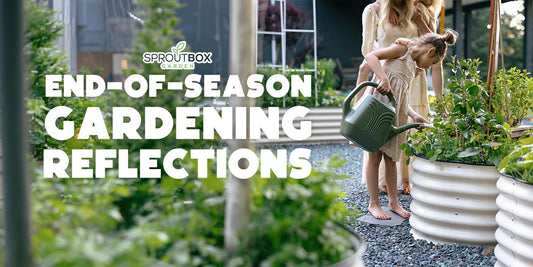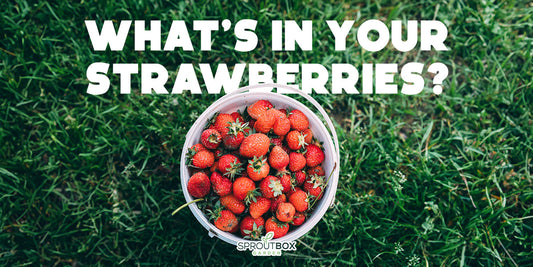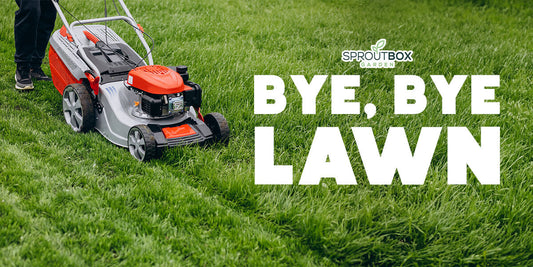Metal Raised Garden Beds vs. Wood: Which is Right for You?

For many of us, the dream of stepping into our backyard to pluck fresh veggies for dinner isn't just a pastime—it's a practical way to cut down on grocery bills. But let's be real, gardening can quickly turn from a budget-friendly venture into a wallet-draining hobby if we're not careful about our choices, especially when it comes to setting up our garden beds.
So, you're thinking about joining the green thumb club or maybe upgrading your current setup. The question pops up: Metal or wood raised garden beds?
Let's break it down, keeping in mind that we're all about making gardening easier on your back and your bank account.
Metal Raised Garden Beds.
The mention of metal raised garden beds often conjures images of galvanized steel troughs or aluminum window wells – options that, while creative, come with their own set of worries about rust, toxic chemicals, and unsightly coatings. It's no wonder some garden enthusiasts pause at the thought.
Enter Aluzinc-Magnesium garden beds, and the game changes completely. These aren't your average metal beds. These beds are designed to last up to 20 years, offering durability that's hard to beat. Best of all, they're constructed with food-safe materials and coatings, ensuring that your garden is not just a sight to behold but a safe source of your homegrown veggies.
Pros:
-
Innovative Materials: Sproutbox's Aluzinc-Magnesium beds debunk the old myth that metal beds are prone to rust or toxic. These beds are built to last, resist corrosion, and ensure safety for your edible garden.
-
Durability: Outliving their wooden counterparts by (sometimes even) decades, these metal beds can withstand harsh weather without succumbing to rot or deterioration.
-
Ease of Assembly: Forget the toolbox; assembling these modern marvels is a breeze, allowing you more time to focus on planting and less on construction. You can have your garden beds ready for soil within an hour of opening the box.
-
Healthier Plants: Enhanced drainage and protection from the heat mean your plants enjoy optimal growing conditions, leading to a more bountiful harvest.
-
Modular Design: Metal garden beds are designed to fit any backyard or layout, thanks to their modularity. No matter your space's size or shape, these beds adapt seamlessly, ensuring every gardener can maximize their growing area efficiently.
-
Safety for All: Rounded corners and safe coatings mean everyone, from toddlers to seniors, can enjoy gardening without worry.
Cons:
-
Upfront Cost: While initially more expensive, think of this as an investment in your garden's future, saving you money and hassle in the long run.
-
Pests and Weeds: Although the risk is significantly reduced with raised metal garden beds, it's important to remember that no garden bed can offer full immunity to pests and weeds. The design and the material of the beds will allow you to have better control keeping those issues away, but gardeners should still be vigilant over any unwelcome guests in their beds, especially during the winter months.
Wooden Raised Garden Beds.
Heading into the world of wooden garden beds feels a bit like sticking to a classic – it's like vinyl records or vintage cars. They've got that timeless charm and a warm, natural vibe that many gardeners love. Wood beds can make any space feel a bit more down-to-earth and connected to nature. But just like any classic, they come with their own set of quirks and care needs. Let's dig into what makes wooden beds both appealing and a bit of a challenge.
Pros:
-
Natural Aesthetics: There's no denying the rustic charm of a wooden garden bed, blending seamlessly with your garden's vibe.
-
Affordability Upfront: Typically, wooden beds cost less at the outset, making them an attractive option for the budget-conscious gardener. Of course, you’ll need to replace them more frequently, leaving you spending more in the long term.
-
Biodegradable Material: Wooden beds are eco-friendly in the sense that, at the end of their life, they can break down naturally, reducing environmental impact. That is, of course, if you’re avoiding pressure treated wood.
-
DIY-Friendly: For those who love a hands-on project, wooden beds offer the perfect opportunity for customization and personal craftsmanship.
-
Easy to Modify or Repair: Need to adjust the size or height? Some additional wood, nails, and a bit of elbow grease can get the job done without the need for specialized tools or skills.
Cons:
-
Decay and Maintenance: Wood is prone to rot, pest infestation, and weather wear. Expect to replace or repair your wooden beds every few years.
-
Chemical Concerns: Treated wood can contain chemicals you might not want near your food. Untreated wood is safer but less durable.
-
Assembly Inconveniences: Getting lumber can be real hassle. From having to go to the hardware store, to hoping they have what you need in stock. Plus, wood can warp, and bend as it gets wet, leaving you with a suddenly-broken garden bed and hundreds of dollars of effort spilled on the ground.
-
Weight and Portability: Wooden beds, especially when filled, can be quite heavy and difficult to move, limiting flexibility in garden layout changes.
-
Increased Water Usage: Wooden beds may require more watering compared to their metal counterparts. Wood raised beds often have poor drainage/water retention, which can lead to a higher need for watering, making your gardening less affordable and eco-friendly.
Our Verdict: Metal Wins.
When you break it down, metal raised garden beds are the champions of the easy, affordable, and thriving garden. They make life simpler with their durability, ease of assembly, and plant-friendly design. Sure, the upfront cost might be a bit higher, but the long-term savings in maintenance, replacement costs, and sheer frustration are well worth it.
For those of us looking to save money by growing our own veggies or seeking to avoid turning our passion into an expensive hobby, metal raised garden beds offer a solution that keeps our gardens, wallets, and backs happy. So, let's make the smart choice for our gardens and our future harvests. Happy gardening!



